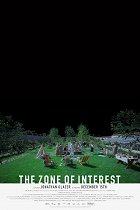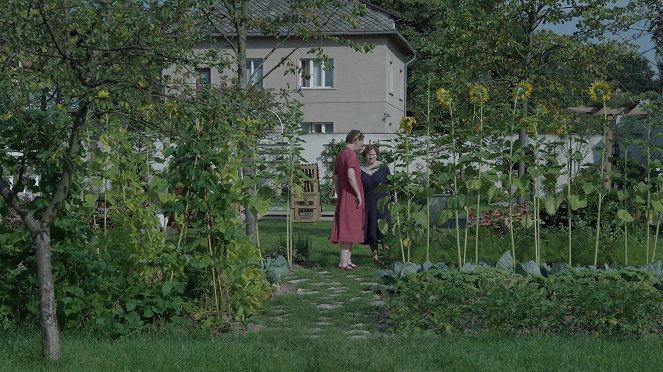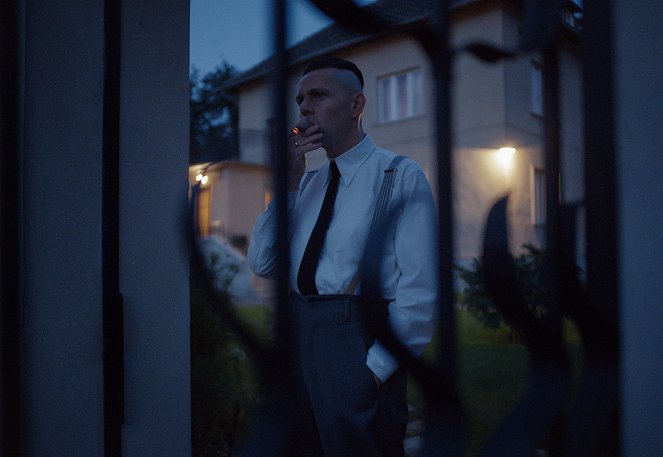Directed by:
Jonathan GlazerScreenplay:
Jonathan GlazerCinematography:
Łukasz ŻalComposer:
Mica LeviCast:
Sandra Hüller, Christian Friedel, Ralph Herforth, Freya Kreutzkam, Max Beck, Ralf Zillmann, Imogen Kogge, Stephanie Petrowitz, Marie Rosa Tietjen (more)VOD (3)
Plots(1)
The commandant of Auschwitz, Rudolf Höss, and his wife Hedwig, strive to build a dream life for their family in a house and garden next to the camp. (SF Studios Fin.)
Videos (4)
Reviews (10)
We have seen the horrors that took place in concentration and extermination camps many times on the cinema screen, but this time we take an unconventional look from the other side of the wall, at the life of an Auschwitz commander and his family. Well, it's a disgustingly perfect idyll: a lovely home, a beautiful garden with a pool, a house full of servants; the Höss don't lack for anything. What is happening behind the wall is presented to the viewer only in small "icy" details: the young son playing in the beautiful flowering garden and behind him in the house we see only the steam rising from a train arriving at Auschwitz; the family celebrating a birthday in the garden and behind them we see the incinerator in full swing; they are bathing in the river and suddenly ashes start falling down on them. We all know very well what that means, Jonathan Glazer is counting on it, and he manages to create a perfectly chilling contrast. It also presents a picture of a happy family, which is something I thought about many times in the past because I always found it very controversial. We know all too well what monsters the SS could be, but at the same time they could be, and probably were, loving fathers, something that is beautifully portrayed here. Rudolf Höss is a likeable dad (if it weren't for his uniform, he wouldn't be so different from your friends), but then he picks up the phone and starts figuring out how to streamline the final solution to the Jewish question; at a social event his wife asks him who were the people there and he answers that he doesn’t care about the people, that he was thinking how to gas everything, but it was logistically difficult – that was quite hard to stomach. It took me a while to get used to the way the film is shot, it feels a bit documentary-like, and by the end credits I almost ripped my ears off from the accompanying "music" in agony, but it was a very powerful experience. [Festival de Cannes 2023]
()
I have a bit of a complicated relationship with director Jonathan Glazer. I like some of his films a lot, others practically not at all, and I'm glad Zone of Interest falls into the former group. I'm also happy that it ended up looking a little different than I expected. Glazer's Holocaust drama is very much built on working with sounds, but mostly with the viewers and their knowledge. You have to know what family you're looking at all the time, who Rudolf Höss was and what atrocities he committed. Zone of Interest doesn't explain anything, you could say that we learn practically nothing about the protagonists, because there's no need to, and Glazer is counting on you paying attention in history class, or at least reading the synopsis before entering the cinema. This allows him to focus solely on establishing atmosphere, combining hints of the horrors happening behind the walls of the family home while showing the ordinary little Nazi domestic bliss of the Hösses and their children. They come across as extremely ordinary, and that they are cynics and human monsters is something you have to surmise from their actions, as they balefully ignore the hell they themselves have unleashed or are willingly profiting from. Perhaps my only complaint is that I would have expected Zone of Interest to make it a little harder (like, say, the new Scorsese) and more uncomfortable for me as a viewer. On the other hand, Glazer's attempt to merely chronicle the family life of two monsters who tend a greenhouse, organize family get-togethers in the garden, and invite a loving mother to their home, only to occasionally subtly remind us who we're actually dealing with, works well too. An original and compelling drama capable of being very uncomfortable at the right moments.
()
The Zone of Interest depicts the concentration camps and the Holocaust from a truly novel point of view, and this is why it will not be lost among the thematically close films. Jonathan Glazer's film does not primarily target the audience's eyes, but rather their ears and general awareness of the horrors of war: at first glance we see the ordinary life of an ordinary family, but on second viewing (or listening) and placing the film in the context of the time, it evokes extremely uncomfortable feelings. On the one hand we have an idyllic, almost 'Garden of Eden', on the other (behind the fence) we can hear screams and gunshots, while in the distance we watch the smoke (of death). To the sound of a sometimes literally poignant musical score, we witness that pure evil can take on a completely mundane, innocent form. As in Anatomy of a Fall, Sandra Hüller gives a supremely impressive performance and I'm curious to see what roles await her in the future. Last but not least, I praise the play with negative imagery, which contributed to the film's unpleasant atmosphere. Perhaps only the closing documentary insert left me with mixed feelings.
()
A formally interesting experiment (being created concurrently with the book of the same name by Martin Amis), drawing attention to a topic that we should have already processed. Many fundamental questions concerning the primary human attitude, such as "How could the main commander of the Auschwitz concentration camp, Rudolf Höss, calmly sleep, go home every day, and peacefully have dinner with his family...?" should not be posed for the first time by a co-produced film. Similarly, the everyday life of Höss's wife, Hedwig, should not surprise or fascinate us for the first time. On the contrary, we should have a rich knowledge of the reality of the war and be able to work with it. Many prominent women from this time have written memoirs, which in many ways only repeat, complement, and explain to us what and why happened in their lives. They serve excellently as memories, especially the memoirs of secretaries Traudl Junge, Brunhilde Pomsel, and Louise Fox. The question of obedience to authorities and blind fulfillment of orders was thoroughly analyzed by Hannah Arendt in her series of reports "Eichmann in Jerusalem: A Report on the Banality of Evil". Furthermore, we should be immune to demonizing the German language itself and always remember that the Third Reich existed for only 12 years and is primarily the language of Goethe, Schiller, and Rilke. It is absurd to what extent the current public is not interested in the new film Terezín, but the Oscar-nominated The Zone of Interest naturally appeals to moral values and interest in the matter. However, if this trendy film brings some understanding even to those viewers who only watch new titles, this concession can be accepted.
()
Scenes from National Socialist married life and a film whose concept is drawn so tight that it left me feeling oddly indifferent. The idea of transforming a death factory into a 2D backdrop, which Łukasz Żal’s camera literally pushes through the depth of field to the Hösses’ “garden of paradise” is suffocating and oppressive, but it also leads to a certain monotony and risks making the viewer get used to it just as the characters get used to the ubiquitous stench, screaming and moaning. The central couple cannot be humanised to a sufficient extent to form a psychological counterpoint to the horrors of the Holocaust, so I found that there was something mechanical in the Hösses’ routines that made it easier for me to disconnect from the urgency of Glazer’s world. The banality of evil is precisely and literally illustrated. I was reminded of Markus Schleinzer’s similarly conceived and distanced film Michael, which, however, started to be truly impressive at the moment when the character of the blasé paedophile rapist gets an adversary in the form of the victim in a powerful reverse shot. Glazer chooses a similar principle at the end, but in doing so, he breaks the fourth wall in a way that has more intellectual calculation than natural power. Was Höss aware of the moral implications of his actions or was he able to conceal them in the rhetoric of industrial production and historical necessity? This is where the possibilities of Glazer’s film reach their limit. In the ever-powerful deluge of “Holocaust porn”, The Zone of Interest is important for its differentness and its courage to change the perspective, to expose the viewer to the “cognitive dissonance” experienced by the direct perpetrators of evil. It is also an interesting reflection on the central ideological concept of Lebensraum, which in the portrayal of Frau Höss takes the form of a neat garden fertilised with the ashes of the dead. Nevertheless, I enjoy reflecting on the film from a distance significantly more than experiencing it directly on the screen. In that respect, I give preference to the concept of Son of Saul…and to reading the immensely monstrous The Kindly Ones, which went much deeper into the psyches of the architects of the Holocaust than The Zone of Interest.
()



Ads